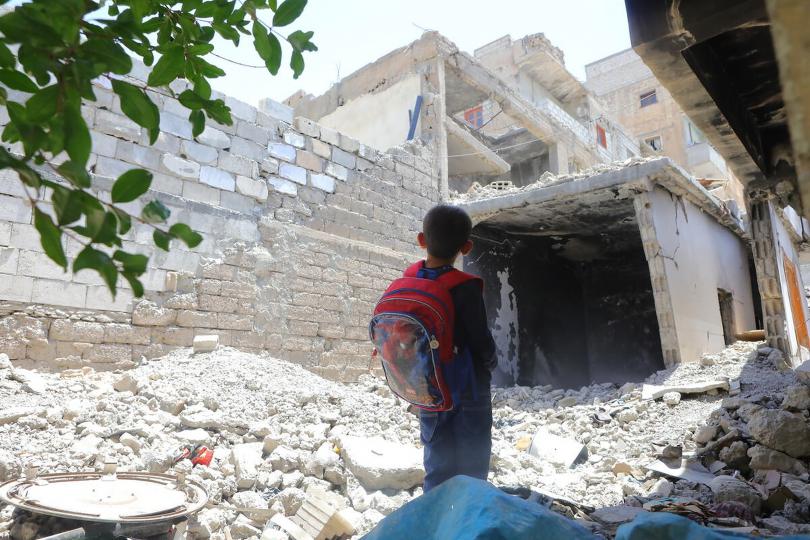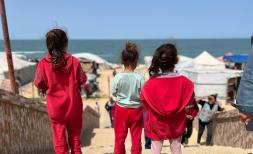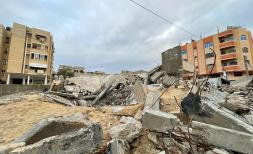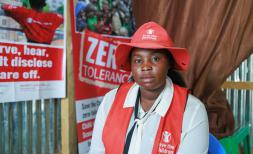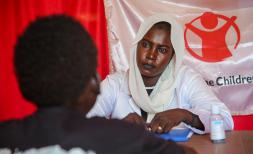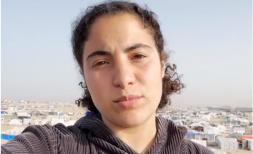Surviving is Just the Beginning: The Impact of Conflict on Children’s Mental Health
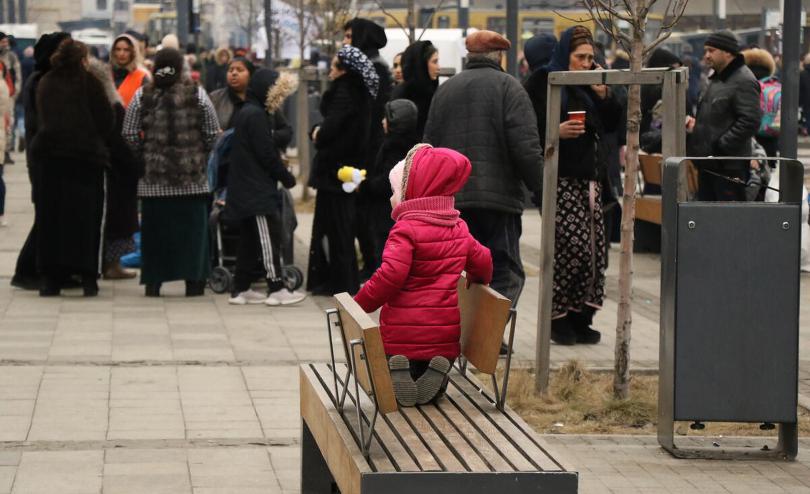
Every child, no matter where they live, deserves to live a safe, happy and healthy life. However, right now, one in six children around the world - over 449 million children - are living in a conflict zone. This means more children are living and growing up in extremely insecure and frighteningly challenging situations that could harm them for life.
{cta | We stand side by side with children in the world’s toughest places. <span class="text-primary">Your support is urgently needed</span> | https://donate.savethechildren.org/en/donate/what-would-you-save | Donate Now
The prolonged exposure to war and uncertainty means that many children are in a state of ‘toxic stress’. Children in Syria, Yemen, Gaza, Ukraine and many other war-torn countries share the same experiences of loss, destruction and could have lifelong implications on their physical and psychological wellbeing.
Children have been bombed and starved. They have seen their friends and families die, and schools and homes turned to rubble. They have been denied food, medicine and vital aid, and been torn away from their lives as they flee the fighting.
The psychological toll of living through continuous conflict, not knowing if this day will be their last, is enormous. Surviving is just the beginning for them. Distressing conflict-related events can affect children's psychological and emotional wellbeing in various ways, and have a long-term impact if left untreated.
Here are 5 ways conflict impacts children’s mental health:
1. Anxiety, Loneliness and Insecurity
Many children living in conflict zones have lost their homes through shelling, have been displaced from their neighbourhood, and have had to leave their friends and family.
Such loss and disruption can lead to high rates of depression and anxiety in war-affected children. The importance of family, and the nurture and support that it provides to children, means that being separated from parents can be one of the most significant war ordeals of all, particularly for younger children.
“[The children] are always stressed. Constant anxiety. We notice that Syrian children, through our work with them, they are not like other children. They’re always stressed. Any unfamiliar noise, if a chair moves, or if a door bangs shut, they have a reaction. This is the result of their fear – of the sound of planes, of rockets, of war,” explained Ahmed, a recreational coordinator in Idlib, Syria.
In Yemen, repeated attacks on schools and civilians have led children to live in constant fear and suffer from profound negative emotions that have left them feeling worried for their safety and the safety of everyone around them.
“Seeing the destruction and rubble left by the war in the region, especially remains of a school that a child used to attend, has contributed to the deterioration of children’s psychosocial well-being. Children are beginning to exhibit signs of chronic anxiety, fear and insecurity,” said a school principal from Taiz, Yemen.
This constant state of anxiety can lead to bed wetting, difficulty falling asleep, nightmares, and strained relationships with their loved ones.
Issa*, 7 in the damaged neighbourhood of Al Raqqa where he lives. Muhannad Khaled/Save the Children
2. Emotional Withdrawal
Children exposed to multiple sources of violence may eventually also become desensitised and emotionally numb, which increases the possibility of them imitating the aggressive behaviour they witness and considering such violence as normal. This in turn can affect their ability to build successful relationships with others in the long run.
Olha*, mother of seven from northern Ukraine explained:
“We’ve become used to the bombing, it’s been almost a year already, so we’re used to it. The longer it takes, the harder it is. The children are used to shelling. When it gets too loud, they run, but otherwise they ignore it”.
In Yemen, an aid worker from Taiz, explained a similar situation:
“Children are growing isolated and introverted; they no longer interact with their communities and peers…some have been born into this and do not know what a friend is.”
3. Aggression
Children that have grown up surrounded by armed conflict may show aggression and withdrawal in their behaviour with peers and family members. They may start fighting with, and shouting at their friends or bullying other children.
One of our psychologists in southern Syria explained it like this:
“There is a lot of pressure on children at home. There are no playgrounds, nowhere for them to play…they can’t even go on the streets. There is no option for them to leave the house, to do some activity, to play, to play football. This is why children tend to become more aggressive because they don’t get the chance to release this energy in them.”
In one of our summer camps in Poland for refugee children from Ukraine, Maria, a psychologist at the camp, noticed an increase in aggressive behaviour among children, especially adolescents:
“Teenagers have latent aggression. And for that aggression to not be taken out at home, on parents, on their loved ones – neighbours, friends, or colleagues, here I help latent aggression come out in a playful form.”
4. Psychosomatic Symptoms
Children in Syria have told us how their high levels of stress manifest in physical symptoms such as pains in the head and chest, difficulty breathing, and in some cases temporary loss of movement in their limbs:
“When I sit alone and start to think, my stomach starts to hurt. This is when I really understand the situation I’m in, when I really think about it”, Tarek, 15–17 years old from Syria.
Many children can have difficulty in speaking or begin to stutter, and some can even experience partial amnesia.
“We see children from six to 15 who are not able to remember. The psychology of children has changed – a child is always anticipating an attack now. Children have lost their childhood.” Tamara, an aid worker in Idlid, Syria.
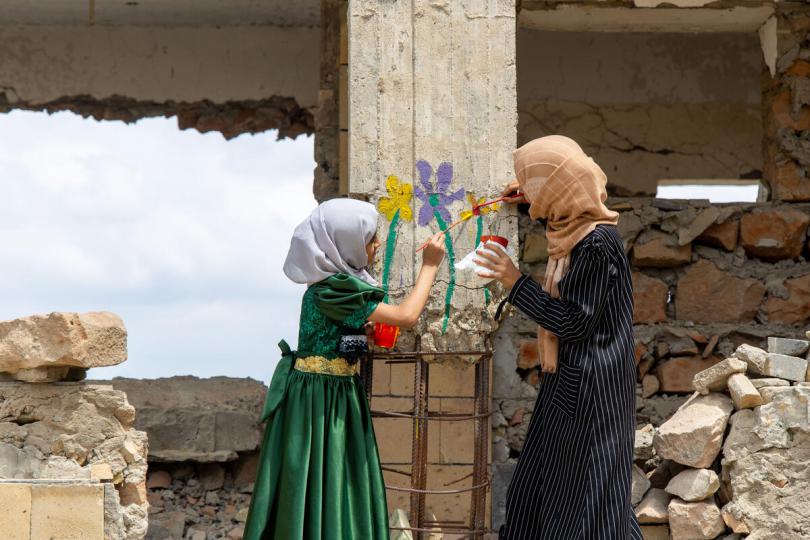
Children in Yemen paint a flower mural on the walls of a destroyed school as part of the Flowers for Children campaign. Albaraa Mansoor/Save the Children
5. Turning to Self-Harm
Sadly, in some cases, children see no other option than to try to escape what they are experiencing and their surroundings by using drugs and alcohol or even self-harm and suicide.
Rasha, a teacher in southern Syria told us:
“They often take drugs to forget the current situation they’re living in, in order to feel better.”
However, social stigma and ingrained attitudes to mental health remain a significant challenge. Drugs or perpetrating self-harm or considering suicide remain taboo topics in many communities, especially in conflict settings, where men are expected to “man up” and girls to marry. So, as a result, a lot of cases remain potentially under-reported by communities.
Save the Children’s Mental Health and Psychosocial Support work
Children in distress need to feel heard and to know that people care.
Through mental health and psychosocial support (MHPSS) and education programmes, Save the Children has been able to help children better cope with their experiences. Our approach to MHPSS programming is often delivered through our Child-Friendly Spaces.
Child Friendly Spaces are safe spaces were children can redevelop emotional relationships and resume social practices that have been interrupted by war. Some of the activities carried out include:
The HEART (Healing and Education through the Arts for children) programme was designed by Save the Children as a form of psychosocial support in which children benefit from learning to adapt and overcome the distressing situations they have experienced through arts-based group activities.
Our Child Resilience work is a comprehensive programme that addresses children’s wellbeing in a holistic way, recognising that children’s wellbeing is influenced by their interaction with their parents or caregivers, their peers and others in their community.
Psychological support delivered by psychologists which helps children and teenagers understand what is happening to them and cope with their feelings.
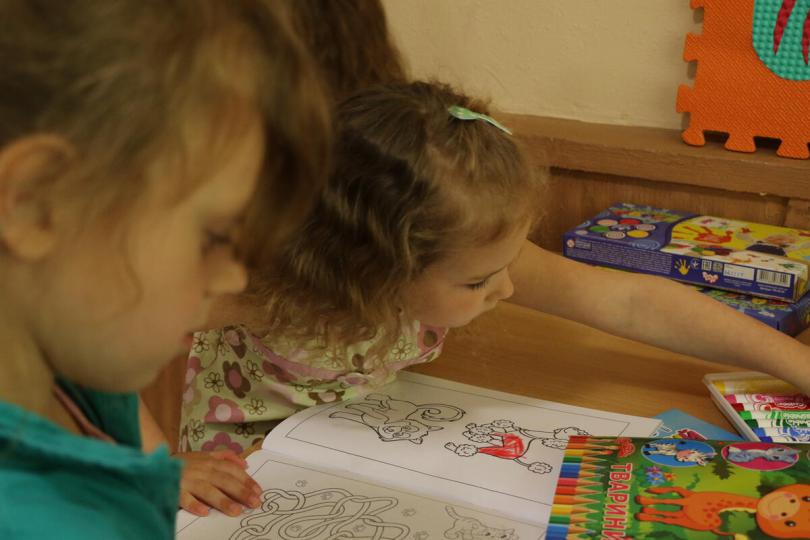
Children playing in the child friendly space in Chernivtsi, Ukraine. Save the Children.
The work Save the Children staff carry out every day to help children overcome what they have experienced is vital to ensure they can grow up to live meaningful and fulfilling lives.
Mental health is still a stigma in many places, meaning children often do not get the support they desperately need. Raising awareness about its importance and ensuring we are there to offer ways to cope is essential.
You can help us do so by sharing this blog with your network or by donating to our Children’s Emergency Fund to help children living in crisis around the world.
